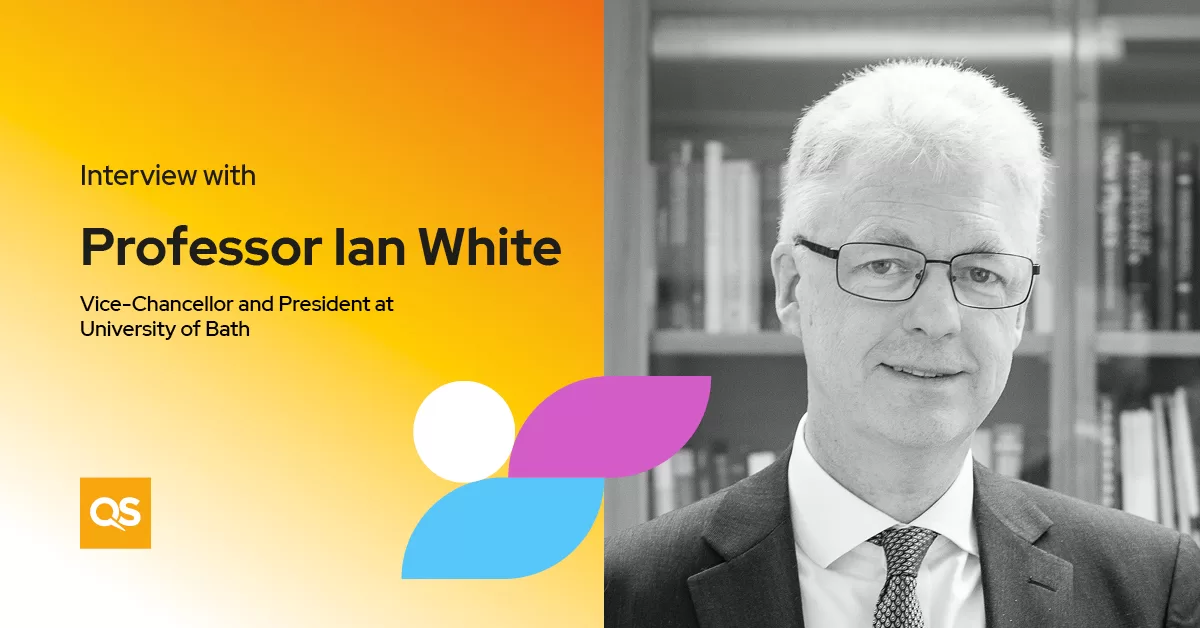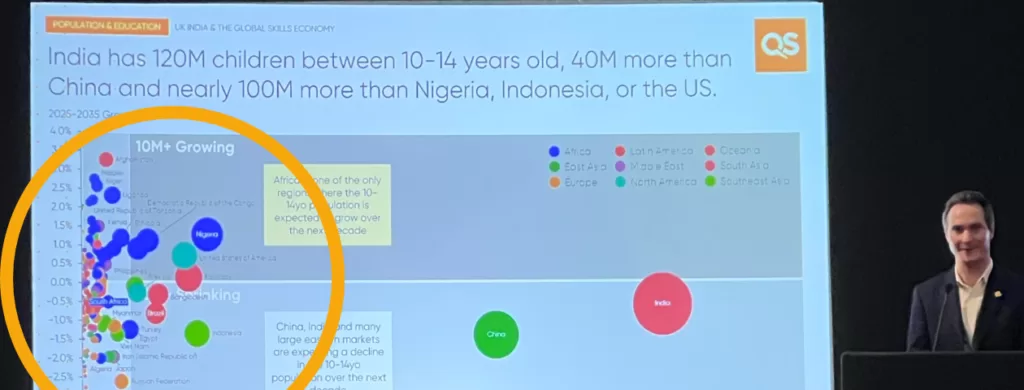
The higher education sector is uniquely placed to holistically develop students for the uncharted territories of our globalised world. Strong collaboration in academia-industry partnerships equips students with the skills they require to thrive in a career in the knowledge age.
Speaking at the QS India Summit 2024 is Ian White – Vice-Chancellor and President at the University of Bath (ranked 148th in the QS World University Rankings 2024 and 92nd globally in the QS World Sustainability Rankings 2024).
Ian will be moderating the panel discussion: ‘Bridging the gap: Nurturing industry-academia partnerships’ at the summit. He commented that as Vice-Chancellor he is “both the academic leader and chief executive of the University” and that he is “fortunate enough to be only the seventh in this role since the University received its Royal Charter in 1966.”
“In the long term, we are able to demonstrate that our research has the potential to transform society.”
Ian explained that “the topic of academia-industry partnerships is particularly relevant to the University of Bath, given our Charter and founding principles” and added that partnerships between higher education and industry, governments and wider society enables the University to accomplish more together than alone: “In the long term, we are able to demonstrate that our research has the potential to transform society.”
We spoke with Ian to explore the potential avenues for improving increased university-industry partnerships and initiatives the University of Bath has implemented to address current and developing challenges.
How do increased academia-industry partnerships prepare students for the modern world of work?
“They help students better understand how their academic learning might have value when they enter the modern world of work, bridging the gap” Ian answers. But on a general level: “Partnerships enable the University to ensure that it better serves society – through the kinds of research that we do, the curricula that we teach and the way that we envisage the relationship between academic learning and society at large.
“Preparing our students for the workplace goes beyond the application of their learning; our educational offerings build the capabilities for a smooth transition into the professional workplace post-graduation, many of which are the intangible ‘soft’ skills – arguably the ones which will be most important in an AI-enabled workplace.”
The subtleties gave rise to success
Ian says context plays a key role in students applying their learning to solving problems: “I think this is where Bath operates very well in our education, so our students develop the right mindset to apply their knowledge and achieve positive impact. I believe it is this approach, combined with the quality of students we attract, that has led to the University of Bath doing so well in graduate outcomes and employability.
“It’s important to understand that it isn’t a one-way transaction, in that it’s not just the University and our students that benefit. It is also hugely beneficial for employers to have that fresh perspective embedded within their organisation and refreshed regularly.
Our influence is evidenced in the feedback we receive from our industry partners.”
Establishing effective initiatives
The University of Bath’s recent ‘Curriculum Transformation’ initiative is a significant overhaul of the university’s educational framework.
“When designing the transformed curriculum, we sought input from employers and a range of stakeholders including professional practitioners and Industry Liaison Partnerships and Panels. We ensured that employers, including those from industry, were engaged with the design and development of our courses, helping to ensure our course content, design and relevance remain at the forefront of knowledge and practice and are aligned to the needs of employers.”
The University of Bath have developed purpose-built facilities to drive innovation and research, with a commercial focus, through their business and industry collaboration: Institute of Advanced Automotive Propulsion Systems (IAAPS), the University support industry in the development and adoption of clean, efficient and affordable zero carbon propulsion technologies for integration into commercial applications.
“We recruit the best students, who add value through their time with us and with whom we remain in touch as they progress into transformative and influential roles. The consistency with which we are able to provide businesses and large organisations with high-quality students on placements, and graduates whom they may wish to recruit to their workforce cements our reputation within the industry and is paramount in building and maintaining those partnerships.”
“We need to ensure that partnerships are adding widely recognised value to both partners, to ensure that they become about the organisations rather than the individuals involved. “
New discoveries and breakthroughs
Institutional and organisational relationships require a long-term commitment. What challenges do universities face when sustaining these partnerships over a long period of time?
At the University of Bath, Ian cites the key challenges they have come across and the initiatives they have put in place to address them.
- Culture and pace: although the higher education sector can be fast, sometimes our processes can affect our pace. When in partnership with other organisations we need to ensure we can respond and react effectively, whilst still maintaining our own culture and good governance arrangements.
- Over-reliance on individuals: partnerships are about people, but institutional partnerships shouldn’t be over-reliant on particular individuals as that can undermine them as people move on in their careers.
- Challenges to long-term relationships come from maintaining contacts within companies through frequent staff changes. Where these staff changes are in more senior positions in the company, they can lead to changes in recruitment strategy and focus.
- Changes in the economy and fluctuations within sectors can lead to redundancies and changes in recruitment, such as the COVID pandemic, environmental policies and AI and technological developments. We (need to) work closely with our stakeholders to respond in an agile manner.
- We need to ensure that partnerships are adding widely recognised value to both partners, to ensure that they become about the organisations rather than the individuals involved. It is important that we are mindful of the dynamic nature of business when seen from the perspective of the rather longer timescales associated with universities.
“Not every partnership needs to be at institutional level, and individuals and teams can forge really productive connections in relation to their own areas of work.”
As well as nurturing existing recruiters, Bath’s Active Employer Engagement team maintains close relationships with graduate recruiters:
“Bath remains one of the most targeted HEIs for graduate recruiters because of the combined effort of our Placements & Careers teams. There should be a level of institutional, strategic oversight of the most significant relationships in terms of scale and scope. We have found that it is vital to ensure that these partnerships are adding widely recognised value to both partners, and to ensure that they become about the organisations to ensure continuity.
“Through placement visits we are able to speak directly to managers within the organisations, gaining feedback on how well our degree programmes help our students to transition into the diverse ranges of roles available, providing us a sense of the skills needed both now, and the future. This can then be considered for future course development. This helps to maintain our relationship with the company, as our students continue to fulfil their talent pipeline needs.
“However, it is equally important to accept the flourishing of partnerships at all levels of an organisation. Not every partnership needs to be at institutional level, and individuals and teams can forge really productive connections in relation to their own areas of work.
“At their core, universities are about people. People working together, to advance knowledge, for the global common good. And I believe University leadership is about the institution providing the best possible ecosystem for students and staff to thrive and to realise their ambitions.”



